Key Takeaways
Yelp’s success model lies in combining restaurant discovery, reviews, and seamless booking.
To develop an app like Yelp, you need thorough market research, the right mobile app tech stack, intuitive design, and scalable development.
Core features include restaurant listings, filters, user reviews, maps, and booking integrations, enhanced with AI-driven personalization.
The cost to create an app like Yelp typically ranges between $40,000 to $120,000+, depending on complexity, features, and region of development.
Monetization strategies such as premium listings, ads, and subscription plans ensure long-term revenue.
With the right strategy and support from JPLoft, you can build a Yelp-like platform that is competitive and future-ready.
“Where should we eat tonight?” This simple question has transformed how millions of people use apps like Yelp to discover restaurants, book tables, and read trusted reviews.
With its massive popularity, many startups and entrepreneurs are asking, “How to develop an app like Yelp?” The process involves defining core features, designing intuitive UI/UX, choosing the right tech stack, and testing before launching on Google Play and App Store.
In today’s digital-first dining economy, building a Yelp-inspired app can open doors to new opportunities. Such apps not only help users explore top-rated restaurants but also support businesses in gaining visibility and customer trust.
If you’re an entrepreneur or investor looking to tap into this market, learning how to create an app like Yelp and understanding the process of Yelp-like app development is your first step toward success.
An Overview of Yelp: A Restaurant Booking App
Launched in 2004, Yelp has evolved into one of the best restaurant apps, helping millions of users discover places to eat, reserve tables, and share authentic reviews. Its core value lies in connecting people with local businesses through user-generated content, building trust and credibility.
Unlike traditional directories, Yelp integrates restaurant booking app features with community-driven reviews, photos, and ratings. This combination has made it a global leader in dining discovery and local search. Businesses also benefit from Yelp’s exposure, gaining visibility among highly engaged audiences.
For entrepreneurs, Yelp provides a proven blueprint. If you’re exploring how to develop a restaurant app, studying Yelp’s growth model is a smart starting point. Its success highlights the importance of intuitive design, real-time booking options, and robust search filters that simplify decision-making for users.
The platform has also expanded beyond restaurants, offering listings for salons, gyms, and home services, proving that Yelp’s concept isn’t limited to food. This flexibility shows why building a similar app can be lucrative across industries.
In short, Yelp is more than a directory; it’s a dynamic ecosystem that blends technology, reviews, and convenience into a seamless user experience.
Why Create an App like Yelp?
With the rise of digital dining and on-demand services, many entrepreneurs wonder, why create an app like Yelp? The answer lies in the growing reliance on mobile solutions for restaurant discovery, bookings, and reviews. A Yelp-inspired app can open significant business opportunities in 2025 and beyond.
1. Growing Market Demand
The food and dining sector is rapidly adapting to digitalization. Current restaurant app development trends show increasing user engagement through mobile-first platforms. Building an app like Yelp means tapping into a booming market where customers expect convenience, real-time availability, and trusted reviews.
2. Strong Revenue Potential
Apps like Yelp generate revenue through ads, premium listings, and partnerships. Replicating this model gives entrepreneurs multiple income streams. For startups, the ability to develop an app like Yelp with monetization features creates a sustainable business model.
3. Changing User Behavior
Today’s customers rely on mobile apps to explore dining options, compare menus, and book tables instantly. This shift makes it the right time to make an app like Yelp that aligns with modern expectations of speed and transparency.
4. Learning from Failures
While the market is growing, not every app succeeds. A key lesson comes from analyzing why restaurant apps fail, usually due to poor design, weak engagement strategies, or lack of differentiation. Entrepreneurs can use these insights to avoid pitfalls.
5. Room for Innovation
The market isn’t saturated. There’s still space for creative restaurant app ideas, whether through AI-powered personalization, niche discovery apps, or advanced loyalty programs. This opens opportunities to stand out in a competitive landscape.
In short, the decision to build or create a Yelp clone today isn’t just about copying a successful platform; it’s about entering a thriving market with space for growth, innovation, and long-term profitability.
How Does an App like Yelp Work?
Before you decide to develop a Yelp clone, it’s essential to understand how the app functions. Yelp follows a streamlined workflow designed to deliver seamless user experiences while supporting business visibility.
Step 1: User Registration and Profiles
Users begin by signing up with basic details, preferences, and location. This allows personalized recommendations and easy access to saved restaurants or reviews. A clean and intuitive restaurant app design ensures smooth onboarding.
Step 2: Search and Discovery
The core of Yelp lies in its powerful search engine. Users can filter restaurants by cuisine, ratings, distance, or cost. Algorithms prioritize relevance, helping users find the best options quickly.
Step 3: Reviews, Photos, and Ratings
User-generated content reviews, star ratings, and photos add credibility. This feature not only builds community trust but also influences dining choices, making it a cornerstone of Yelp-like app development.
Step 4: Booking and Reservations
Beyond reviews, Yelp integrates restaurant reservations. Users can check table availability and book directly within the app. This functionality mirrors other successful platforms, and businesses exploring how to build an app like TheFork can learn from this integration.
Step 5: Business Dashboard
Restaurants get access to a dashboard for updating profiles, responding to reviews, and promoting listings. While this boosts engagement, it also introduces restaurant app development challenges such as data management, review authenticity, and ensuring system scalability.
In short, Yelp works as a multi-sided platform: helping users discover dining options, enabling bookings, and offering businesses tools for visibility.
Anyone aiming to make a Yelp clone should first analyze this functionality and adapt it with innovations that fit today’s market.
Features to Include in an App like Yelp
The success of Yelp largely depends on its powerful and user-friendly features.
If you want to build a restaurant app like Yelp, you need to ensure it offers the same level of convenience and engagement.
Below are some of the top restaurant app features every Yelp-like app must have.
► User Profiles & Onboarding
Simple and secure registration through email, phone number, or social login is a must.
Personalized profiles allow users to save preferences, write reviews, and bookmark restaurants.
This is the first step if you plan to create a Yelp clone that feels engaging and interactive.
► Advanced Search & Filters
The ability to filter by cuisine, distance, ratings, or budget improves the discovery experience.
Users want quick and accurate results that align with their needs. Adding these filters ensures your Yelp-like app development caters to modern user expectations.
► Reviews, Photos, and Ratings
This is Yelp’s signature feature and a key driver of trust. Reviews with photos and star ratings allow users to make informed decisions.
It’s also one of the strongest ways for you to make a Yelp clone that stands out for credibility.
► Booking & Reservations
Integrating booking options lets users reserve tables without leaving the app. This feature is essential for anyone learning how to build a restaurant booking app, as it directly enhances customer convenience and restaurant engagement.
► Push Notifications & Loyalty Programs
Timely reminders, discounts, and reward points keep users engaged. Businesses can send targeted offers, increasing conversions. It also creates new opportunities for monetization, showing how restaurant apps make money through engagement-driven strategies.
► Business Dashboard & Analytics
Restaurants must have access to tools for updating menus, responding to reviews, and tracking performance. While developing such dashboards, thorough restaurant app testing is crucial to ensure smooth functionality and error-free performance.
► AI-Powered Recommendations (Future Scope)
AI can enhance personalization by suggesting restaurants based on user behavior. It adds competitive advantage to your app and should be considered when planning for developing a Yelp clone that remains future-ready.
► Maintenance and Scalability
After launch, ongoing updates and scalability matter as much as initial development. Proper restaurant app maintenance ensures features remain secure, functional, and compatible with evolving user expectations.
Including these features in your roadmap ensures you don’t just create a copy but actually deliver a competitive platform. If you’re exploring the steps to make an app like Yelp, getting these fundamentals right is non-negotiable.
How to Develop an App like Yelp?
Building a Yelp-like platform requires more than just coding; it demands strategy, planning, and the right execution. By breaking the process into clear stages, you can ensure your app not only launches successfully but also delivers long-term value. Below is a step-by-step guide to build an app like Yelp.
Step 1: Market Research & Planning
Before diving into development, it’s essential to understand the landscape you’re entering. Market research and planning lay the foundation for your app’s success.
A] Analyze the Market
Look at recent restaurant industry trends, emerging technologies, and consumer preferences. By studying what users value most in discovery and booking apps, you can identify gaps that your product could fill.
B] Identify Your Audience
Define your target users, foodies, travelers, or busy professionals, and shape features around their needs. An app that resonates with its audience from day one gains faster traction.
C] Study Competitors
Evaluate how apps like Yelp, Zomato, or OpenTable attract users. Identify their strengths and weaknesses to design a roadmap that avoids common mistakes while improving on their best features.
D] Define Business Model
Decide whether you’ll monetize via subscriptions, ads, or partnerships. This clarity early on helps align development decisions with your long-term vision.
Step 2: Choose the Right Tech Stack
A solid technology stack ensures scalability, speed, and reliability. Making the right choices here reduces your Yelp like app development costs later.
A] Tech Choices for App Development
Selecting the right frameworks, programming languages, and cloud services is crucial. The right mobile app tech stack determines how quickly your app can scale to handle thousands of users without crashing.
B] Database & Backend Setup
Your backend should be robust enough to store millions of listings, reviews, and images. Using cloud-based solutions with auto-scaling ensures smooth performance during traffic spikes.
C] API Integrations
To provide core Yelp-like features, integrate APIs for location tracking, maps, payments, and social logins. These integrations improve user convenience while saving time in development.
D] Security Protocols
From securing payments to encrypting personal data, robust security measures are vital. Meeting compliance standards like GDPR or PCI-DSS builds user trust and avoids legal pitfalls.
For food-tech businesses, understanding why restaurant app security matters is critical; it protects sensitive customer information, ensures safe transactions, and strengthens the overall reliability of your platform.
Step 3: Design User-Centric UI/UX
A Yelp-like app must be simple yet visually appealing. The design decides whether users stay or uninstall within minutes.
A] Wireframing & Prototyping
Start by sketching the app’s structure with a mobile app wireframe to outline the basic layout and flow.
Once the structure is clear, move on to mobile app prototyping by creating clickable mockups that let you visualize the user journey and test interactions before actual coding begins.
This approach minimizes errors, saves development time, and ensures a smoother user experience.
B] User-Friendly Navigation
Users should be able to search, filter, and book in seconds. Smooth navigation ensures they find what they want without frustration.
C] Design Consistency
Maintaining consistent colors, typography, and spacing enhances your mobile app design. Good design also supports accessibility, making your app inclusive for everyone.
D] Feedback Loops
Gather early feedback from test users to refine layouts and flows. Iterative improvements save money compared to post-launch design overhauls.
Step 4: Backend & Frontend Development
With designs in place, development brings your app to life. This phase combines technical skills with agility.
A] Agile Development Approach
Breaking the project into sprints allows flexibility. Teams can adapt features based on evolving requirements or user feedback.
B] Core Feature Coding
Listings, reviews, and booking functionalities form the backbone of a Yelp clone. Ensuring these work seamlessly is critical before adding advanced features.
C] Third-Party Integrations
Payments, maps, and push notifications add convenience. These integrations make your app more competitive in the crowded restaurant app market.
D] Building the Right Development Team
Bringing in experts to hire dedicated developers ensures efficiency and quality. Skilled developers can foresee challenges, optimize performance, and deliver faster results.
Step 5: Testing & Quality Assurance
No app should launch without rigorous mobile app testing. QA ensures a smooth, bug-free experience for users.
A] Automated Testing
Automated scripts catch recurring bugs across devices and OS versions. This saves time compared to manual repetition.
B] Manual Testing
Human testers explore the app intuitively, uncovering issues automation might miss. Their insights often reveal user experience flaws.
C] Performance Testing
Apps must perform under pressure. Load tests simulate thousands of users to ensure stability during peak hours.
D] Security Audits
Regular audits safeguard sensitive information like payment details and personal data. Strong protection builds long-term user trust.
Step 6: Deployment & Post-Launch Support
Launching is only the beginning. Ongoing support ensures your app continues to grow and adapt.
A] App Store Deployment
To successfully publish your app on Google Play, or Apple Store, you must meet all submission guidelines and requirements. Optimize app titles, descriptions, and visuals for maximum visibility.
B] User Onboarding Campaigns
A strong launch strategy with tutorials, promotions, and incentives boosts early adoption. Smooth onboarding enhances retention.
C] Maintaining App Quality Over Time
Ongoing mobile app maintenance services help fix bugs, release updates, and maintain compatibility with new OS versions. Regular updates show users your app is active and trustworthy.
D] Feature Scaling
Once your user base grows, add advanced tools like AI-driven recommendations, loyalty programs, or voice-based ordering to stay competitive.
Developing an app like Yelp is not an overnight task; it requires strategy, technical expertise, and long-term commitment.
By following these six steps, you’ll create a platform that not only launches successfully but also adapts to evolving user needs.
With the right team and a structured process, building an app like Yelp becomes a tangible, achievable goal.
The Role of AI in Yelp-like App Development
Artificial Intelligence (AI) is transforming how modern apps interact with users, and a Yelp-like app is no exception.
Integrating AI can streamline restaurant discovery, personalize user experiences, and optimize backend operations.
For anyone planning how to develop an app like Yelp, understanding AI’s role is crucial to stay competitive in today’s app market.
1. Personalized Recommendations
AI algorithms can analyze user behavior, past searches, and reviews to suggest restaurants tailored to each individual.
This personalization keeps users engaged and encourages repeated usage, making it a vital feature in Yelp like app development.
2. Intelligent Review Analysis
With natural language processing (NLP), AI can automatically analyze reviews to identify trends, popular dishes, or common complaints.
This helps both users and restaurant owners make informed decisions. AI in restaurant apps is particularly useful here, transforming raw data into actionable insights.
3. AI Chatbots and Virtual Assistants
AI-powered chatbots can assist users in making reservations, answering FAQs, or even providing dining suggestions.
These virtual agents reduce human workload and provide instant responses, showcasing the role of AI agents in restaurant apps.
4. Voice Search and AI Ordering
Voice-enabled search and ordering capabilities are increasingly popular.
Users can quickly find restaurants or place bookings using voice commands, powered by AI voice ordering in restaurant apps. This adds convenience and modernizes the user experience.
5. Predictive Analytics for Business Insights
AI can forecast peak hours, customer preferences, and restaurant popularity trends.
For restaurant owners, this predictive insight allows better inventory management and targeted promotions.
Integrating these analytics is part of AI app development services to enhance overall functionality.
6. Creating Smarter App Features
Developers can leverage AI to automate processes like fraud detection, review moderation, and personalized notifications.
Entrepreneurs looking to create an AI app will find these features invaluable for improving app reliability and user satisfaction.
Incorporating AI into your Yelp clone not only enhances user engagement but also provides restaurant owners with actionable insights.
From personalized recommendations to AI-powered chatbots, the possibilities are endless, making AI a game-changer in how to create an app like Yelp.
What's the Cost to Develop an App like Yelp?
Yelp like app development requires careful budgeting to ensure all features, integrations, and design elements are accounted for. On average, the cost to develop an app like Yelp ranges between $40,000 and $120,000, depending on the scope, platform (iOS, Android, or both), and custom features.
The total cost depends on multiple factors, from the complexity of the app to the technology stack used. For entrepreneurs wondering how to develop an app like Yelp, understanding these cost drivers is essential.
A] Platform and Technology Considerations
Choosing between iOS, Android, or a cross-platform solution affects the overall budget. Opting for the right technology ensures smooth performance, scalability, and future updates, directly influencing the cost to develop an app like Yelp.
B] Design and Development Costs
UI/UX design, frontend development, and backend infrastructure form the bulk of expenses in your yelp like app development cost. Partnering with the best mobile app development company ensures high-quality output and seamless execution, which can save time and reduce errors.
C] Feature Integration and Custom Functionalities
Adding features such as search filters, reviews, ratings, geolocation, notifications, and analytics will influence the mobile app development cost. Advanced functionalities may require more investment, but they enhance user engagement and retention.
D] Competitor Benchmarking
Analyzing competitors helps set realistic expectations. The cost to build a restaurant reservation app like opentable serves as a useful reference when planning your app’s capabilities and features.
E] Maintenance and Updates
Post-launch support, periodic updates, and bug fixes are essential for app performance. The cost to develop a restaurant app should include ongoing maintenance to ensure security, functionality, and a smooth user experience.
F] Budget Planning and Prioritization
Allocating funds for each stage from design to feature integration helps manage the overall budget efficiently. Clear planning prevents overspending while ensuring the app meets business goals.
Developing a Yelp clone involves more than just coding. Accounting for design, features, maintenance, and competitor benchmarking helps deliver a high-quality, user-friendly app that stands out in the market while keeping the cost to develop an app like Yelp aligned with your business goals.
Best Monetization Strategies for Your Yelp Clone
Creating an app like Yelp is just the first step; making it profitable requires smart monetization strategies. Understanding how revenue can flow through your platform ensures sustainability and growth.
1] Advertising and Sponsored Listings
Restaurants and local businesses can pay to be featured at the top of search results or on banners.
This boosts visibility and drives traffic while generating consistent revenue for your app.
Integrating sponsored listings strategically keeps the user experience smooth while maximizing income.
2] Premium Subscriptions
Offer premium features to restaurants, such as advanced analytics, priority listing, or exclusive promotions.
Users can also subscribe for an ad-free experience or access to exclusive deals. This model adds recurring revenue and encourages user loyalty.
3] Transaction Fees and Commissions
If your Yelp clone includes booking or ordering functionality, charging a small commission per transaction is an effective monetization method.
It creates a steady revenue stream while providing value to restaurants and users alike.
This approach aligns with the model of how to start an online restaurant business, allowing restaurants to reach new audiences while paying for services that boost their revenue.
4] In-App Promotions and Partnerships
Collaborate with restaurants, events, or local businesses for sponsored deals, coupons, or promotions.
This strategy not only monetizes your platform but also keeps users engaged with relevant offers.
Partnering with a reliable mobile app development company UK can help implement seamless integrations for these promotional features.
5] Data-Driven Insights for Revenue Growth
Aggregating user behavior and reviews can help your app provide actionable insights to restaurants.
Selling anonymized analytics or offering consultation packages creates an additional revenue channel without compromising user trust. In the long run, adopting flexible mobile app monetization strategies like these will ensure sustainable growth.
By combining multiple monetization strategies, advertising, subscriptions, commissions, promotions, and data insights, your Yelp clone can generate substantial revenue while providing a valuable platform for both users and businesses.
Connect with JPLoft, and Build your Own App
Turning your vision of a Yelp clone into reality requires the right expertise and a reliable partner. JPLoft, a trusted restaurant app development company, specializes in creating custom, feature-rich apps tailored to your business needs.
With years of experience in app development, JPLoft helps businesses streamline processes, enhance user experience, and scale efficiently. Our team ensures your app includes all essential features, from user-friendly search and reviews to booking and ordering functionality.
Partnering with JPLoft not only guarantees high-quality development but also provides guidance on app monetization, maintenance, and updates. Whether you want to build an app like Yelp from scratch or develop a customized Yelp clone, their solutions cover the full development lifecycle.
By collaborating with JPLoft, you can launch your app faster, avoid common pitfalls, and ensure a smooth experience for both users and restaurant partners. It’s your first step toward creating a profitable and popular restaurant booking platform.
Conclusion
Creating an app like Yelp requires a careful blend of planning, design, and execution. From understanding how to develop an app like Yelp? to integrate essential features, monetization strategies, and AI capabilities, every step contributes to the success of your platform.
A well-executed Yelp clone can connect users with restaurants seamlessly, generate revenue, and offer a competitive edge in the market. By focusing on user experience, robust functionality, and strategic monetization, your app can stand out and thrive in the restaurant booking industry.
Whether you’re aiming to develop a Yelp clone from scratch or enhance an existing platform, investing in the right development approach ensures long-term growth and sustainability.
FAQs
The best way to develop an app like Yelp is to start with a clear strategy, define essential features, and choose the right development partner. A step-by-step approach ensures the app meets user needs and scales effectively.
Building a Yelp clone typically takes 4–6 months, depending on complexity, features, and design requirements. Including AI integrations or advanced functionalities may extend the timeline.
Yes, AI can enhance user experience by offering personalized recommendations, smart search, and predictive analytics, making your app more engaging and competitive.
The cost to create a Yelp clone varies based on features, platform choice, and technology stack. For a standard app development project, the cost may range from $30,000 to $80,000, while advanced AI-driven apps can cost more.
Your app can monetize through advertising, premium subscriptions for restaurants, transaction fees, and partnerships, creating multiple revenue streams.
To develop an app like Yelp, you’ll need to follow a structured process:
Market Research & Planning – Analyze competitors and define unique features.
UI/UX Design – Create intuitive, user-friendly layouts with easy navigation.
Technology Stack Selection – Choose suitable frameworks, programming languages, and databases.
Core Feature Development – Implement listings, reviews, ratings, geolocation, and search filters.
Testing & Quality Assurance – Ensure the app works smoothly across devices and platforms.
Deployment & Maintenance – Launch the app on iOS/Android stores and provide ongoing updates.
The cost to develop an app like Yelp typically ranges from $40,000 to $120,000, depending on features, design complexity, and developer expertise.





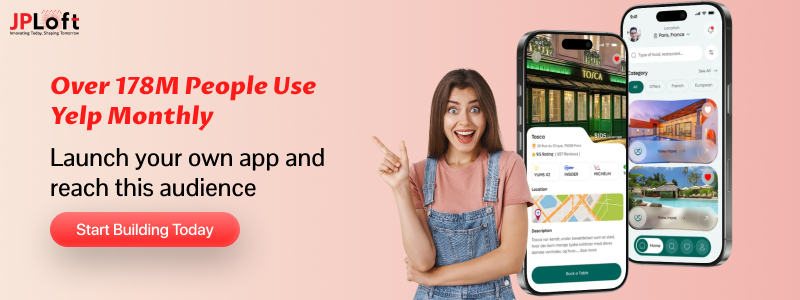
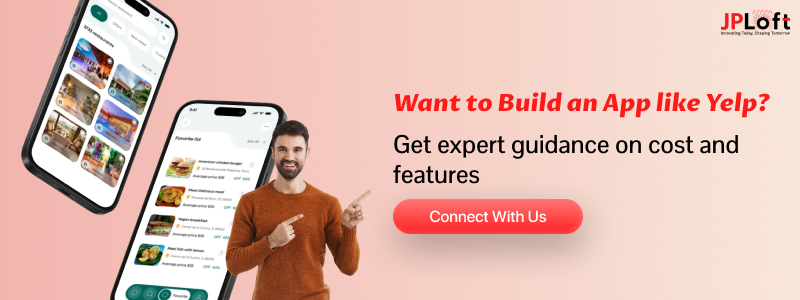

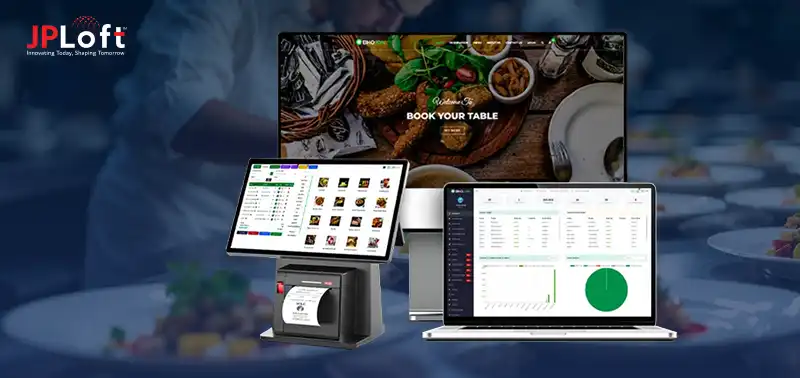
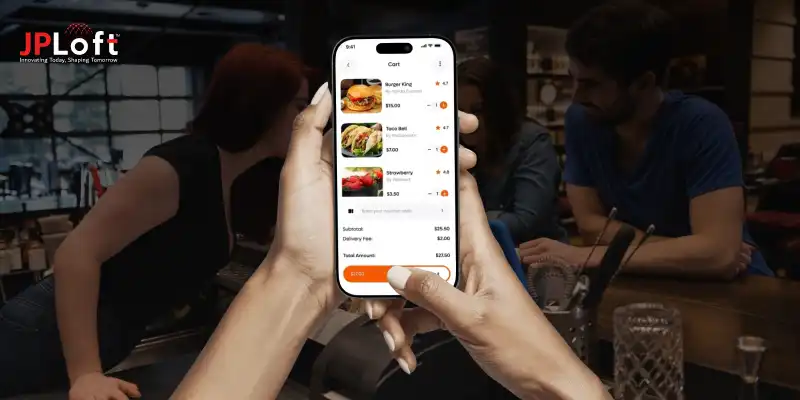
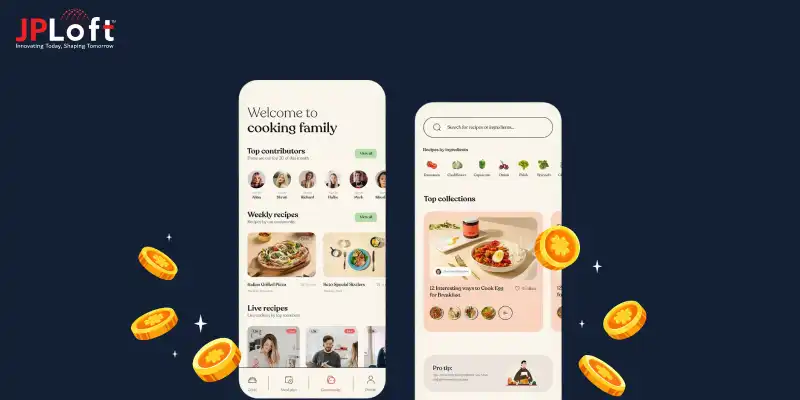


Share this blog